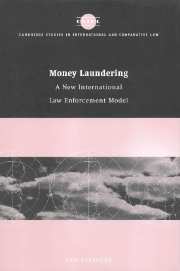Book contents
- Frontmatter
- Contents
- Preface
- Table of treaties and agreements
- List of abbreviations
- Part I New instruments in the fight against acquisitive crime: confiscation of proceeds from crime and criminalisation of money laundering
- Part II The prevention of money laundering
- Part III Jurisdiction over money laundering
- Part IV International co-operation in combating money laundering
- 11 The money laundering regime: new objectives of international co-operation in criminal matters
- 12 The money laundering regime: new modes of international evidence-gathering
- 13 Some of the conditions, principles and exceptions of mutual judicial assistance in criminal matters revisited
- 14 Lifting banking secrecy in an international context
- 15 Provisional measures for preserving alleged proceeds of crime in an international context
- 16 International enforcement of confiscation orders
- Epilogue
- Bibliography
- Index
- CAMBRIDGE STUDIES IN INTERNATIONAL AND COMPARATIVE LAW
13 - Some of the conditions, principles and exceptions of mutual judicial assistance in criminal matters revisited
Published online by Cambridge University Press: 16 October 2009
- Frontmatter
- Contents
- Preface
- Table of treaties and agreements
- List of abbreviations
- Part I New instruments in the fight against acquisitive crime: confiscation of proceeds from crime and criminalisation of money laundering
- Part II The prevention of money laundering
- Part III Jurisdiction over money laundering
- Part IV International co-operation in combating money laundering
- 11 The money laundering regime: new objectives of international co-operation in criminal matters
- 12 The money laundering regime: new modes of international evidence-gathering
- 13 Some of the conditions, principles and exceptions of mutual judicial assistance in criminal matters revisited
- 14 Lifting banking secrecy in an international context
- 15 Provisional measures for preserving alleged proceeds of crime in an international context
- 16 International enforcement of confiscation orders
- Epilogue
- Bibliography
- Index
- CAMBRIDGE STUDIES IN INTERNATIONAL AND COMPARATIVE LAW
Summary
In the following, three pivotal features of international co-operation in criminal matters will be critically analysed: the condition of double criminality, the political and fiscal offence exception and the locus regit actum principle. All three aspects play an essential role in the international fight against money laundering and their position will be vetted, not only in the context of mutual judicial assistance, but also in the context of new forms of (primary) co-operation in criminal matters. The crucial question in this respect is whether the chauvinistic rationales that underpin these basic rules of international co-operation can still be reconciled with the internationalist approach that was advocated earlier.
The condition of double criminality
Double criminality as a condition to co-operation, that is as a requirement for taking measures on a foreign request, needs to be distinguished from double criminality as a condition to jurisdiction, that is as a requirement for punishing conduct that took place abroad. After an overview of the role and legal basis of the condition of double criminality, in particular in the context of co-operation against money laundering, it will be argued that, save in the particular case where a confiscation procedure is started upon a foreign request, the condition of double criminality is not rooted in the legality principle. Hence the thesis that the condition of double criminality can be abolished without lowering the level of (human) rights protection will be defended.
The condition of double criminality in international co-operation in criminal matters
Mutual judicial assistance has long been subjected to the same conditions as extradition, and hence also to the condition of double criminality.
- Type
- Chapter
- Information
- Money LaunderingA New International Law Enforcement Model, pp. 287 - 310Publisher: Cambridge University PressPrint publication year: 2000

